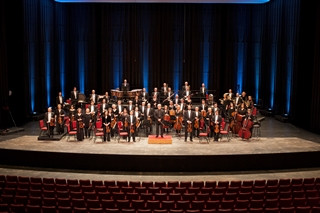|
Back
Less than felicitous match Ottawa
Southam Hall, National Arts Centre
09/30/2014 -
Franz Peter Schubert: Symphony No. 1 in D minor, D. 82 - Symphony No. 2 in B-flat major, D. 125
Wolfgang Amadeus Mozart: Piano Concerto No. 20 in D minor, K. 466
Jeremy Denk (piano)
National Arts Centre Orchestra, Pinchas Zukerman (conductor)

Courtesy of NACO (© Felix Sanchez)
An orchestral program with early Schubert Symphonies in the first half, then a Mozart Concerto in the second, might prompt audiences to anticipate a consistent late classical mood with hints of Romanticism for the entire evening. As it turned out, the last in the National Arts Centre’s ‘Vienna Festival’ series which opened the current season, was anything but that.
Schubert was in his teens when he composed his first two Symphonies and they are astounding works. The Symphony No. 1 with its brisk opening rhythms, following a brief Adagio introduction, is indeed redolent of Mozart. But this is far from being a juvenile ‘copycat’ work and for sheer imagination it invites comparison with, if anything, Bizet’s Symphony in C major, also the product of a teenage genius and prodigy. The second movement, Andante, is characterized by richly rococo phrasing and elegant dialog between strings and winds. The Menuetto further features delicate winds, though it is rather stately, almost more like a Polonaise. The closing movement, opening with soft strings, is again mainly brisk and forceful.
In the Symphony No. 2, Schubert’s orchestration had become more inventive. The energized opening movement leads to a contrasting Andante; while in 4/4 rhythm, this movement has a decidedly Viennese lilt and, again, questioning dialog. The Menuetto is darkly formal and the final movement, Presto Vivace is very ‘presto’ and very ‘vivace’.
Conductor Pinchas Zukerman accomplished much in both works, leading his players to performances which were rock solid rhythmically and otherwise, though never academic or stodgy. Indeed, he let both Symphonies breathe, respecting Schubert’s emerging genius and youthful ardor as a creative musician. The performances emphasized but never exaggerated the works’ structure and drama, and admirably held listeners’ attention.
After intermission, it was almost a different world. Mozart’s Piano Concerto No. 20 is one of his most beloved works and, formally and texturally, prefigures the Romanticism of the 19th century. It is almost a template for the Concerti of Chopin, Schumann, Grieg and others. Nevertheless, its roots are firmly in the classical period. However the guest soloist, American pianist Jeremy Denk, appears to have other ideas. His playing in the first movement was so chronically rushed, constantly racing ahead of the orchestra, one was reminded of reports of the tug of war back in 1928 when Sir Thomas Beecham and Vladimir Horowitz made their American debuts with Tchaikovsky’s Piano Concerto No. 1.
However this performance was Mozart, not Tchaikovsky, and it was difficult to comprehend how Mr. Denk’s approach had developed. There were further problems due to the Hamburg Steinway which didn’t project well and was consistently overwhelmed by the orchestra. Denk managed to acquit himself effectively only in the more lyrical second subject (which, initially, has a more discrete orchestral accompaniment), and also in the elaborate cadenza (his own quite clever composition), though this also projected poorly. The slow movement had some good stretches, but in the last, Denk again was constantly rushing and there were moments that could be described a sloppy, and accordingly perplexing.
At best, there appeared to have been insufficient rehearsal for the work and, notwithstanding their coordinated neo-Nehru attire, Zukerman and soloist Denk were not a felicitous match.
Charles Pope Jr.
|